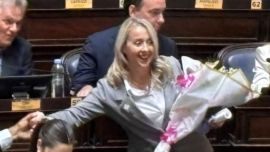When we think of what Congress does, we think epic – the fundamental laws of the nation, the preservation of the republic or halting the hegemonic instincts of government. Such is the big picture and it’s important.
But behind that grand agenda there is a hidden agenda which is less relevant at first sight. A task combining the precision of the watchmaker with the tenacity of the archaeologist.
This reference to archaeology is no accident. Argentina’s judicial framework is such a jumble of historic layers that, like the seven cities built on top of Troy, it goes adding norms which pile up one on top of each other.
The deep-seated belief that the state looks after you and the conviction that human interaction is a battlefield between the powerful and defenceless citizens has led us over the years to regulate everyday life in Argentina by placing limits on everything. In principle everything is forbidden while what isn’t is subject to innumerable restrictions. The state delves into even the most intimate details – for example, if you install a bathroom, you’re obliged to have a bidet.
This is a problem because voluntary human interaction occurs if both sides stand to benefit, which is why the restrictions we impose often do more harm than good. The recent rental law (ley de alquileres) would be a good example.
Hence the task of seeking out those wedges, those blocks, those restrictions, sometimes imperceptible but which, without our realising it, can destroy entire industries. The day we succeed in identifying and eliminating them, we will look behind us and ask ourselves: Why did we ever forbid that?
Today I want to illustrate this challenge of legal archaeology using as an example a single word which, when inserted with the best intentions, destroyed an entire industry. I hope that this anecdote serves to enthuse the new legislators entering Congress with their role as legal archaeologists. While some use a telescope to detect their future path, it is necessary for others to clear away the stones impeding their advance.
Let’s come to the point. Article 288 of the Civil and Commercial Code stipulates that “in electronically drafted instruments, the requisite of a signature is satisfied by the use of a digital signature, ensuring beyond all doubt the authorship and integrity of the instrument.”
This not only seems innocuous but downright modern. But the problem is the use of the term “digital signature.” According to Law 25,506 of 2001, a digital signature must be certified by a centralised licensing authority on paper and in the presence of both parties. The usual practice is to obtain a token (typically located in a pendrive) containing the certificate. The result? Nobody does the paperwork, nobody has a token and the digital signature thus serves no practical purpose. Paraphrasing Juan Perón, who said: “Who’s seen a dollar?”, we might say: “Who’s seen a token?”
Law 25,506 was promulgated in 2001 with all the best intentions in the world. But since then, encryption alternatives like blockchain permit instantaneous forms of signature like those which can be done today by, for example, the DocuSign programme, whereby millions of documents are signed in the United States. But, of course, Article 288 has prohibited their use or denied their legal validity in Argentina.
In 2017, we worked, with Horacio Liendo III in the forefront, on deregulation decrees later converted into Law 27,444 to change the word “digital” to “electronic,” thus encapsulating those other technologies in order to disassociate the signature from the definition of Law 25,506. We did this for Law 24.452 governing cheques, credit cards and banking IOUs. We strictly stipulated that “if the instrument was drafted by electronic means, the requisite of a signature will remain satisfied by the use of any method ensuring beyond doubt the expression of the will of the parties and the integrity of the instrument.”
Lifting the prohibition on other forms of signature generated a revolution in the issuance of cheques, giving birth to the e-cheq which any users can sign from their laptops without tokens. No deviations are permitted since every phase is fully registered and nor can they be lost or stolen and nor is any movement needed. All the parties involved have access to it at any time (whereas the physical cheque is only located in the recipient bank). With so many virtues, it is no surprise that they are rapidly replacing the physical cheque. The result was indeed a revolution and today electronic cheques already represent almost half the cheques issued, being set to soon replace physical cheques completely.
Due to the agility of their execution, deferred cheques are the most accessible credit instrument for our PyMES (small and medium-sized companies). By prohibiting electronic cheques, the state had restricted the agility of one of the most important credit instruments in the system. By thus protecting us, the state was not looking after us in reality.
The interesting thing is that with millions of electronic cheques issued these days, none of the situations of risk, fraud or litigation which Article 288 was seeking to avoid has ensued. People do not interact in order to mess each other up. As we said, voluntary transactions only come about to leave both sides better off. The idea that the state has to supervise and regulate each and every one of those transactions is often lethal. We should have more confidence in liberty and begin to fear regulation far more.
This is just an example. Our legislative chambers are full of secret doors behind which important treasures are hidden. Hopefully, the new Congress will bring along many archaeologists who will help us to demolish these imperceptible obstacles. As we said, we only needed to change “digital” for “electronic” in Article 288 to extend our Cheques Law (24,452) to all legislation.
If that little change could trigger great transformations, imagine what it would do extended to all contracts.

























Comments